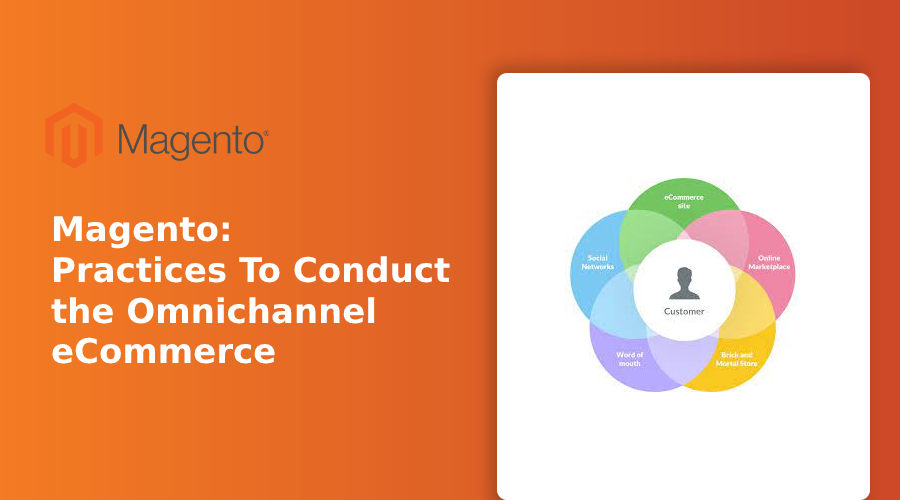
Customers are demanding to have quick access to everything as they are more empowered and knowledgeable about modern technology. As the customers are the core of any size and type of business, brands need to keep themselves updated with the trends. However, the growth of social and mobile preferences also affects retailers in ways they never imagined.
Many 21st century retailers are facing challenges and wondering about how they can use technology like Magento to manage various business operations that help them keep their business operations smoother and, at the same time, meet the increasing customer demand. This gave an introduction to Magento omnichannel eCommerce.
Digital apps make the management process easier for eCommerce stores and help them cater to the changing needs of customers efficiently. The retail model, omnichannel, enables you to provide a seamless shopping experience with all the existing channels. All this is empowered by a centralized data management system, enabling distinctions among channels, both online and physical ones, to be blurred. Magento can be used to conduct omnichannel eCommerce.
Table of Contents
What is Omnichannel eCommerce?

Omnichannel eCommerce is a digital approach that utilizes multiple channels and provides customers a unified experience across different channels, whether it is from other digital channels or in-store kiosks. It’s critical to offer customers when, where, and what they want.
The customer expectations are growing pressure on retailers and customer product companies to ensure that the promise they’re making to the consumers is kept. This is what retailing and omnichannel eCommerce is all about. McKinsey’s report shows that eCommerce sales have increased by 25% alone; however, with consumer expectations varying with sales, businesses are being vaulted into an era.
Business owners need to keep their businesses updated and implement an omnichannel approach. Whether you slice it, Magento store and omnichannel eCommerce is here to stay and is undoubtedly the right move for most businesses.
Omnichannel Vs. Multichannel eCommerce: Check Difference Here
Let’s break down omnichannel and multichannel eCommerce to understand the term right away. Multichannel eCommerce mainly focuses on selling products on various channels, both offline and online. You interact with consumers through websites, social media, apps, in-store, and phones. The channels aren’t connected, which fails to deliver an improved experience.
Customers expect an experience across different channels, which is where omnichannel eCommerce comes into play. The omnichannel eCommerce primarily focuses on delivering a constant shopping experience irrespective of the channel preferred by the potential consumers. As all channels are connected, businesses can predict what consumers are looking for, helping them to deliver an improved and personalized experience.
How Magento Can Help to Conduct Your Omnichannel eCommerce?
Operating omnichannel eCommerce is undoubtedly the best idea, helping you to elevate the business scope in the hefty competition in the market. It’s clear that a Magento omnichannel eCommerce platform will help you succeed and enables you to spread your wings in multiple ways, including online and offline. This increases the chances of success in today’s competitive market.
Harvard Business Review shows that approximately 73% of customers prefer multiple channels of shopping. However, 7% of consumers shop online, and 20% of them prefer in-store shopping over other options. eCommerce omnichannel accounts for about 23% of retail sales by 2022; it was measured at around 15% in previous years.
About 80% of consumers prefer an omnichannel approach as it helps them to leverage a seamless communication experience. However, about 90% of retailers focus on a seamless omnichannel approach as it’s crucial for business success. Omnichannel eCommerce consumers spend about 10% online and 4% in-store compared to single-channel consumers.
The market dynamic is changing steadily; there are people who consider shopping online and offline. Hence it’s become vital for brands to stay active on all the platforms that people approach for shopping. Hence, businesses are searching for ways to run their omnichannel eCommerce, and no perfect option other than Magento comes to mind.
Consumers are kings, and it’s essential to consider their flexibility and ease, and this is where Magento eCommerce omnichannel concept comes into the spotlight. Hence it’s high time for enterprises to think about Omnichannel, and the Magento platform helps to conduct omnichannel eCommerce.
Magento or Magento 2 is the perfect platform for omnichannel eCommerce as it offers a single source of truth to integrate omnichannel retail. The Magento omnichannel eCommerce enables users to connect all the channels in one place, including social media channels, mobile apps, storefronts, etc. Magento consists of effective features that enable you to run a business, like Magento Shipping, which handles orders from customer touchpoints.

Seamless Shopping Experience
The business market is customer-friendly and streamlined. Customers are communicating across a spectrum from mobile browsers to websites to native apps. Entrepreneurs want their messages to be heard and required to comprise omnichannel eCommerce into the marketing mix.
This simply means that consumers have a consistent experience across all services and channels that will be utilized seamlessly throughout each step in the customer journey without confusion or interruption as to which content is where.
Unified Customer Experience Through Various Channels
Unified “sense” is a unique customer experience with omnichannel eCommerce. Shoppers can view the content on different channels, prices, and services that represent your business position in today’s tough market, which will be identical. Customers have multiple, so it becomes crucial for brands to have their presence and shopping cart support for each of them.
However, they can also benefit from crucial features like in-store pickup, online payments, multiple payments, loyalty programs, and a shipping approach that streamline everything for them. Magento makes this shopping journey like what customers had back in the real world, looking around before shopping for something new.
Key Features Magento Provides to Omnichannel eCommerce
Customers these days expect to influence the purchase process. They wish to decide whether they will begin and complete their shopping online or want to combine both offline and online. For example, choosing products online, adding to a cart, and picking & paying up in-store.
A report by ResearchGate shows that more than 50% of customers prefer doorstep delivery services over other options. However, it’s crucial for many to return products in different ways, like online and in-store. Catering to clients’ demand and market needs for shopping experiences isn’t easy; brands need to opt for new technologies, ways, and strategies to handle the complex tasks.
Here is where Magento platforms can help merchants to streamline their business operations on multiple platforms. It helps to adjust at all stages and satisfy the requirements of every individual efficiently. Want to know what Magento features you can enjoy when you consider it for your omnichannel eCommerce? Check the complete list here.

Responsive Design
No matter what business you have. Whether you are providing NBA NFT marketplace services to users or selling online products, you need to have a responsive design that works amazingly on all mobile and desktops. And Magento eCommerce platforms enable online businesses to opt for ways and tools of presenting the offerings.
Magento uses a responsive web design to adjust the store theme to all digital devices. In today’s mobile age, it’s crucial to have a branded solution that is responsive. Responsive web apps will definitely provide an optimal viewing experience to people on all devices.
Third-Party Integrations
You can boost the efficiency of the eCommerce store with third-party integration. Using Magento can be beneficial for your omnichannel eCommerce as it facilitates lots of third-party plugins. It’s also a vital forum for the creation as who does not want more from a platform?
Amazon and eBay are leading marketplaces in America. And if you want to sell on these platforms, then you can use a variety of Magento extensions. If you have an online eCommerce portal that enables customers one-click access, these partnerships will prove very beneficial for you.
Social Media Integration
Looking to grow your omnichannel eCommerce store using social media? With the analytics and integration of all channels, social channel power can empower your eCommerce store. Attract more customers by integrating their preferred networks into one stream. With a continuously changing landscape, it is crucial that you have an online presence on all platforms.
Mobile Shopping App
Studies show that social media feedback can have a great impact on customers’ purchase decisions. This helps them decide whether they will love to shop from your mobile shopping app or not. However, the Magento app can help you boost your customer base by serving them on the platform they are more familiar with.
Mobile apps facilitate customers to have quick access and help you provide them with great convenience to purchase anything on their schedule. You can ask the development company to use Magento to provide you with the app that caters to all your customers and business needs accurately.
Data Management
Smooth integration of data is essential when you manage multichannel retailing. Omnichannel eCommerce features of Magento offer powerful tools for enterprises to connect with their consumers across different channels. Magento platform provides them control over products and data. It also supports real-time tracking of product inventory and offers multiple currency operations.
Cross-channel Inventory Visibility
Lots of retailers know about inventory; this makes it easier for them to ensure that all their products are accessible to customers. Omnichannel eCommerce brands need to find and utilize the right omnichannel approach so that they can track their potential customers’ data and allocate goods on multiple channels in a provided transaction journey.
Magento platform notifies customers when any items are below average, enabling them to request additional quantities in stock. It also provides suggestions about nearby warehouses you require for employees. This saves shipping costs and time, also without sacrificing service quality.
Parting Words
Omnichannel eCommerce has introduced different places where shoppers can choose where and when they aim to shop. Whether they wish to shop in-store or online. And Magento omnichannel eCommerce offers features enabling you to stay updated with your potential customers’ requirements and satisfy them in a possible manner.












![[SALE OFF] Discount 30% All Premium Extensions On Christmas And New Year 2025 christmas-and-new-year-2025](https://landofcoder.b-cdn.net/wp-content/uploads/2024/12/christmas-and-new-year-2025-1-218x150.png)






